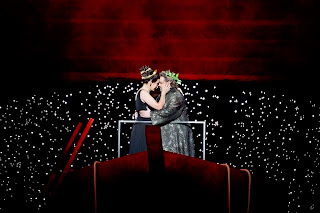Guest Commentator and Schleppy Nabucco Field Agent Mimi Zeffirelli sounds off about Hamburg Staatsoper’s production of Ariadne auf Naxos.
Mimi – As a devotee of opera, a working singer, and an admitted fan of Facebook’s Against Modern Opera Productions, I have been scarred by Regietheater before. Therefore it was with a mix of apprehension and excitement that I took my seat at the Hamburg Staatsoper on November 12, in preparation to experience their Ariadne auf Naxos. What I saw gave me new hope in the future of opera, and an optimistic view of the modern audience.
The first thing that struck me was the demographic of the rather full house. There were children, there were many attendees under 30, and the bulk of the audience seemed to be between the ages of 35 and 65. Decidedly different from the usual Met experience. As the overture began to play, the house lights stayed up for a spell, and the stage became the backstage in a seamless transition, making one instantly feel like they were part of the plot.
Ariadne auf Naxos is an opera about a self-important opera troupe and its overzealous young composer being forced, in order to collect a paycheck, to share the stage with “public entertainment” – a Commedia dell’arteensemble led by the bubbly Zerbinetta. One cannot help but be amused by the parallel to today’s struggling world of classical art.
Christian Stückl (in this 2012 production), sets the action in the present, transforming the Tanzmeister into a delightfully sleazy manager representing the buffo players, who enter wearing neon green sweatsuits, and vaguely resembling the Black Eyed Peas. The stage consists of, well, a stage surrounded by seats identical to those in the theater.
During the Prologue, as the conflict over merging the two productions ensues, the staging, although physically demanding and quite busy, never upstages the important musical moments. In fact, sometimes it adds to them in unexpected ways, such as the instance when, during the Composer’s impassioned outburst, Scaramuccio starts taking cellphone video of his little meltdown, which attracts the attention of the rest of the troupe, and focuses the audience’s eye on the Composer.
As the Opera begins, Naiad, Dryad, and Echo become three audience members, commenting on Ariadne’s torments. Ariadne, surrounded by silent figures of what seems to be a greek chorus, laments her predicament in gorgeous Straussian lines. She is interrupted by the Commedia players who (wearing the much famed “afro-puff wigs” that I had been warned about), satirize not only her ridiculous self-pity, but the self-importance of the Seria troupe.
The singing was solid and functional, although it seemed that three of the leads were either not quite at, or just past, their prime. Maria Markina as the Composer brought great energy to the part, but lacked the vocal opulence and stability to truly do justice to Strauss’ glorious lines. Melanie Diener as Primadonna/Ariadne went on with a day’s notice. The voice is full and beautiful, however she wasn’t quite able to “float” the top, perhaps due to the difficult circumstances. Peter Seiffert as Tenor/Bacchus had a commanding stage presence, and would have been spectacular in the role a few years ago. As a singer, one tends to nitpick the performances, but that aside, all singing was solid and consistent. There was no one on stage who made me nervous or uneasy (unlike quite a few Met experiences of the past few years).
The true star of the show was Olga Peretyatko as Zerbinetta. Superbly comfortable in her body and onstage, vocally solid, and dramatically exciting, she garnered the loudest applause. This, in itself, is comforting. It has been a long while since I’ve heard an audience appropriately react to the singers’ merit, as opposed to their name.
The smaller parts were an absolute joy. Katerina Tretyakova as Naiad, Ida Aldrian as Dryad, and Gabriele Rossmanith as Echo did some of the most nuanced and beautiful singing of the evening. Christoph Pohl, Alin Anca, and Jun-Sang Han as Harlequin, Truffaldino, and Brighella respectively were full of youthful energy, and Chris Lysack stood out as Scaramuccio with his impressive physicality, providing the lion’s share of comedic relief within the “BuffoBlack Eyed Peas”.
The final duet unfolded amidst the backdrop of a starlit sky, and Strauss’ genius shone, as it did throughout the night under the baton of Axel Kober.
In the end, the merging of the Buffo and Seria traditions, done so aptly by Strauss and Hofmannsthal was highlighted in a well balanced production, which seemed to be designed to make an audience member feel part of the action onstage.
And so this devotee of traditional opera made a step toward conversion, seeing how a capable director can remold and refresh an operatic standard, and draw in a larger demographic as a result. As the applause and the attendance proved, there is great future in opera, and so I’m willing to turn a blind eye to some trial and error so that we look for and eventually find our way ahead.
– Mimi Zeffirelli
(Edited by Elizabeth Frayer and Shawn E Milnes)
Related Links:
Mirrored Cubes and Dancing Periods: Die Frau ohne Schatten at the Metropolitan Opera
Choral Excellence, Free Ricola and Eric Owens as the Devil: Mefistofele at Carnegie Hall
Six Characters in Search of a Murder: Two Boys at the Metropolitan Opera








Leave a Reply